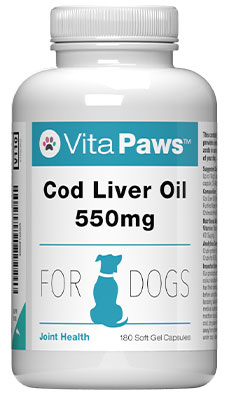Cod Liver Oil for Dogs

Cod liver oil is one of the most popular supplements for dogs. Unlike some other supplements like glucosamine, which have just one primary function in the body, fish oils can have a whole host of potential health benefits for your dog. In this guide we’ll look at some of the most interesting research to date, and discuss the many potential health benefits of cod liver oil for dogs.
What is Cod Liver Oil?
Cod liver oil is a rich source of “essential” fatty acids - so-called because they cannot be made in the body. Instead, they must be consumed in the diet.
Two of the most important of these, which are found in abundance in fish oils like cod liver oil, are known as Docosahexaenoic acid and Eicosapentaenoic acid. Fortunately these are normally shortened to their acronyms DHA and EPA.
Both DHA and EPA are classed as “omega 3” fats, and repeated studies have shown that omega 3 oils help to reduce inflammation in the body. While inflammation might not sound like the biggest problem around, it is actually central to all manner of health conditions from heart disease to arthritis. As a result, cod liver oil can be seen as one of the most reliable “all round” supplements for long-term canine health.
Health Benefits of Cod Liver Oil for Dogs
Cod liver oil has long been used by pet owners to treat a wide range of health conditions. Fortunately a huge volume of research has been carried out on the effects of omega 3 oils in people. The use of cod liver oil in dogs is rather less well-established, and so the scientific research to date is rather more lacking. All the same, a number of impressive studies over recent years have helped to tease apart the reasons why you might want to consider giving your dog cod liver oil.
Cod Liver Oil for Skin Problems
Many breeds of dog suffer from genetically-inherited skin complaints. Westies are a great example of this, with many owners despairing at their poor dog’s dry, itchy skin. Of course, even non-predisposed pets can also suffer from skin complaints on occasion. In many cases these occurrences can be traced back to either nutritional issues or in an overly zealous inflammatory response by your dog’s immune system.
It has long been noted that in humans the ratio of omega 3:omega 6 oils can have a significant impact on inflammation. Omega 6, it seems, increases inflammatory responses, while omega 3 oils - such as those found in cod liver oil - have quite the opposite effect. For this reason, taking supplemental fish oil has been shown to benefit such situations.
Researchers have tested this theory in dogs by feeding them diets specifically designed to give different omega 3:omega 6 ratios. To measure the level of inflammation experienced, blood samples can be easily tested for substances known to cause inflammation. The research shows quite clearly that not only do higher omega 3 foods reduce inflammation, but also that “Omega-3 fatty acid-enriched diets can be used to control inflammation associated with dermatologic conditions”.
While we’ll talk about cod liver oil for arthritis in a few minutes it is interesting to highlight one accidental discovery made. A group of vets prescribed cod liver oil to affected dogs then monitored the improvements in their arthritis. At the same time, however, the dog’s owners were also asked to complete more general surveys about the quality of life their pets experienced during the study period. The results revealed a lot more than just cod liver oils impact on osteoarthritis; the data also reported positive improvements in skin and coat quality.
If your dog is suffering from skin complaints or a dull, dry coat then adding some cod liver oil to their diet might just help to gently lubricate the skin while simultaneously reducing skin inflammation.
Cod Liver Oil for Joints
The research completed to date on canine arthritis is equally positive. One study split arthritic dogs into two groups, then fed them either a standard diet or one enriched with cod liver oil for a period of 13 weeks. Throughout the experiment the dog’s owners were asked to keep a record of their ease of movement and daily activity levels.
The results showed that dogs eating the supplemented diet showed marked improvements in their condition while the standard diet showed no similar improvement. They reported that “high levels of omega 3 from fish origin improved the locomotor disability and the performance in activities of daily living”.
Another experiment involved 131 dogs that both suffered from osteoarthritis and were being treated with painkillers for their condition. The veterinarians then provided half the dogs in the trial with cod liver oil on a daily basis. Throughout the 12 week study period each dog was regularly assessed for signs of arthritic pain, with their pain medications being adjusted accordingly.
It was found that the vets - who didn’t know which treatment each dog was receiving - were able to reduce the use of prescription painkillers far more in the cod liver oil group. This further demonstrates the action of cod liver oil to relieve inflammation - and therefore discomfort - in dogs with joint problems.
Possibly the most intriguing research, however, used cultured dog cartilage. These cartilage cells could be fully observed in the laboratory without risking the health of any dogs, allowing the scientists to carry out studies that otherwise wouldn’t be ethically acceptable. In essence they simultaneously treated the collagen both with inflammatory molecules to mimic arthritis and a range of different omega 3 oil combinations to try and protect them from damage. They found that all treatments of fish oil actually protected the collagen from damage.
Once again, therefore, cod liver may be beneficial for dogs that are perhaps not quite as agile and mobile as they once were. If you have an older dog then supplementing their diet with fish oils (and perhaps glucosamine too) may prove to be well worth it.
Cod Liver Oil for Mood & Aggression
One of the lesser-known impacts of cod liver oil seems to be its ability to positively influence behaviour. Studies in school children, for example, have found that pupils given a fish oil supplement tend to be less aggressive towards their peers. At the other end of the age range, a study in Thailand found similar results when older individuals were also provided with additional omega 3 oil.
Further studies have deepened our understanding of how cod liver oil seems to affect attitude. A group of students were monitored over an extended period of time for symptoms of aggression. It was found that in less stressful situations, such as on days off, no observable difference between the two groups were possible.
Where the results diverged, however, was in situations of mental stress such as during exams. Here the cod liver oil group was far less aggressive towards other students, suggesting that cod liver oil may help to “dull” our fight-or-flight reactions in stressful situations.
While the research in this regard is still in its infancy, it is worth reporting one particularly interesting study involving 18 aggressive male German Shepherds. The owners had reported no other behavioural issues, but their willingness to bite was starting to be a cause for concern. When blood samples were drawn it was noted that the level of omega 3 oils in their body were considerably lower than in better-behaved dogs. They concluded that “low omega-3 fatty acids may adversely impact behaviour in dogs, resulting in greater propensity for aggression”.
While proper socialisation and training should always be the first port of call for avoiding aggression in dogs, there does seem to be an argument that omega 3 supplementation may help to control aggression and anxiety; just one more potential benefit of cod liver oil for dogs.
Cod Liver Oil for Cardiac Health
Possibly cod liver oil’s biggest claim to fame is the effect that it has on cardiovascular health. Heart disease is now considered to be the number one cause of death among people, and can also negatively affect our beloved dogs.
This is why the government currently recommends that we all eat at least two portions of fish each week. If it’s good enough for us, then there is a good chance that our dogs may also benefit.
A huge number of studies have demonstrated positive impacts in not just humans but also a range of other species from rodents, to monkeys and - yes - even in dogs. Interestingly, it has also been noted that animals and humans “show many similar responses… to the consumption” of omega 3 oils - meaning that to a degree positive results in human trials may well indicate a similar impact for dogs.
While heart disease can have a huge number of different causes, one of the most common of all arises in response to high cholesterol as a result of dietary intake and/or insufficient exercise. This cholesterol travels around the bloodstream and can cause a build-up known as “plaque” in the arteries. Plaque effectively reduces the diameter of the vessel, increasing the blood pressure. This, in turn, puts additional pressure on the heart and can also lead to strokes or heart attacks if clots arise.
So How Does Cod Liver Oil Seem to Help?
Firstly scientists have found that omega 3 fat concentrations in the body are inversely related to some risk factors for heart disease. Blood drawn from 62 health dogs found that “concentrations of DHA were… negatively associated” with triglycerides - dietary fats that are considered to be a reliable marker of cholesterol.
Additionally, it is well known that atherosclerosis - the name given to narrowing of the arteries - is largely an inflammatory condition. Cod liver oil, thanks to its anti-inflammatory properties, seems to reduce the appearance of this potentially life-threatening condition.
A range of different substances in the body are responsible for inflammatory responses like those seen in heart disease. Some of the best-known of these are called “interleukins”. A veterinary study of dogs with heart disease found that EPA and DHA levels were lower in dogs suffering from heart failure than healthy animals. After supplementing the dogs with fish oil it was noted that not only did interleukin levels begin to fall, but furthermore that this drop correlated to an improved survival rate.
Some breeds of dog - such as Boxers - are well-known for their irregular heart-beat. This is often known to vets as “arrhythmia”. While many dogs can live a long and (reasonably) healthy life even with such issues, it is not unknown for such dogs to require veterinary support. Interestingly, researchers found that treating arrhythmic dogs with cod liver oil for six weeks reduced incidences of arrhythmia. While the research here is in its very early days, it is just one more shred of evidence to support the potentially beneficial impacts of cod liver oil for dogs.
In general, therefore, the data gathered by scientists so far paints a very convincing picture of cod liver oils ability to help reduce some forms of cholesterol, inflammatory substances and, as a result, to protect the cardiovascular system.
How Much Cod Liver Oil Should I Give My Dog?
A fascinating study looking at the effect of cod liver oil on arthritis in dogs tried to assess the “optimal” dosage for treatment. Dogs were split into groups, with each being fed differing amounts of omega 3 oils per day.
After a 90 day treatment period vets rated the severity of arthritis in each participant, which was then compared to the “pre-treatment” score. Not only did the fish oil supplement demonstrate improvements in arthritic symptoms, but furthermore the results were found to be “dose dependent” with higher intakes of fish oil leading to greater health improvements.
Here at VitaPaws our cod liver oil for dogs has been carefully formulated in conjunction with our animal nutritionists to provide an ideal “maintenance” dose for your pet. Simply follow the instructions on the label. If your dog isn’t experiencing the benefits you had hoped for then you might want to consider increasing the dosage slightly after discussion with your vet.
How Often Should I Give My Dog Cod Liver Oil?
How often should you give cod liver oil to your dog for maximum impact? Just such a question was asked by scientists. A group of dogs were given daily cod liver oil supplements, with blood tests being taken to show how the body reacted to this treatment regime. The results were fascinating. After four days of treatment the level of EPA started to rise, reaching a maximum “accumulation rate” after roughly 28 days. On the other hand, no accumulation of DHA was observed.
These findings suggest two things. Firstly, the impact of EPA should be expected to increase over time for the first few weeks of daily provision. Secondly, DHA doesn’t seem to build up, so should be regularly offered.
Based on these findings it is likely that giving your dog cod liver oil on a daily basis is recommended. This is because less regular treatment may not allow your dog to maintain suitable DHA and EPA levels in the body, meaning the overall effect may be less.
Conclusion
As we have seen, a daily provision of cod liver oil for dogs may be one of the very best things you can do for their health. With a multitude of research pointing to a broad array of benefits, from protecting the cardiovascular system to improving the skin, cod liver oil is one of the best supplements for “all round” health and vitality.

 Richard
Richard 

























